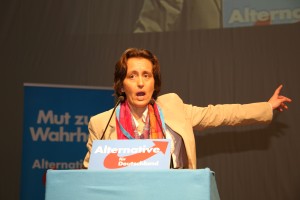AFD Party Surges in German Elections
The Alternative for Germany (AFD) Party broke through parliamentary elections in three German states on March 13. The party’s victories allowed it to gain seats in government for the first time in Rhineland-Palatinate, Baden-Württemberg, and Saxony-Anhalt. Beatrix von Storch, Vice Chair of the radical, right-wing political party, cheered at her party’s celebration in Berlin. She announced that the AFD is no longer only an East German party, but has arrived in the Western States.

The AFD secured its greatest victories in these state elections, winning 15.1 percent of votes in Baden-Württemberg, 12.6 percent of votes in Rhineland-Palatinate, and 24.2 percent of votes in Saxony-Anhalt, according to Die Zeit.
The party captured voters who felt abandoned by establishment parties like the Christian Democratic Union (CDU) and the Social Democratic Party (SPD). 69-year-old Herbert Wermter told Süddeutsche Zeitung that the AFD is the only party that pays attention to his concerns. The AFD harvested public anger by firmly condemning Chancellor Angela Merkel’s refugee policy.
The AFD not only won over voters from establishment parties but also mobilized voters who had previously been apathetic towards politics. According to the Tagesschau, 70 percent of first time voters in Saxony-Anhalt voted for the AFD, demonstrating that populist campaigning mobilizes new segments of the population.
The most divisive electoral issue was Chancellor Merkel’s refugee policy. Merkel has refused to cap the number of refugees Germany will accept. Although the AFD made shocking gains condemning these policies, Bernd Ulrich explains in Die Zeit that about two thirds of Germans voted in favor of a party that supports either Merkel’s refugee stance or an even more liberal policy.
In fact, the Süddeutsche Zeitung argues that supporting Merkel’s refugee policy helped parties win more votes, as the general populace desires reliability and stability in uncertain times. Hence, candidates that supported Merkel, such as the Green’s Winfried Kretschmann and the SPD’s Malu Dreyer, outperformed candidates from parties that attempted to distance themselves from Merkel’s refugee policy.
Therefore, despite the AFD’s stunning net gains, other parties remain dominant in each state government. Die Zeit reports that the CDU retains the most seats in Saxony-Anhalt with 29.8 percent of the votes, the Green Party won the most seats in Baden-Württemberg with 30.3 percent of the votes, and the SPD won the most votes in Rhineland-Palatinate with 36.2 percent of the vote.
Moreover, no party won enough votes to attain a majority in any of the three state parliaments. In fact, in Baden-Württemberg and Saxony-Anhalt a three-party coalition will most likely govern, requiring compromise and cooperation. Both the SPD and the Greens expressed their desire to support Merkel’s refugee policy reports the Tagesschau. Together these three parties can counter the AFD’s marginal presence in parliament; Merkel’s refugee policy will remain on course.
Nonetheless, AFD’s success is a wake up call for establishment parties. Already, Reiner Haseloff, front-runner of the CDU in Saxony-Anhalt, told the Tagesschau that his party must respond on all levels to win back the AFD voters.
Note: An abbreviated version of this article appear in print on March 22, 2016.
